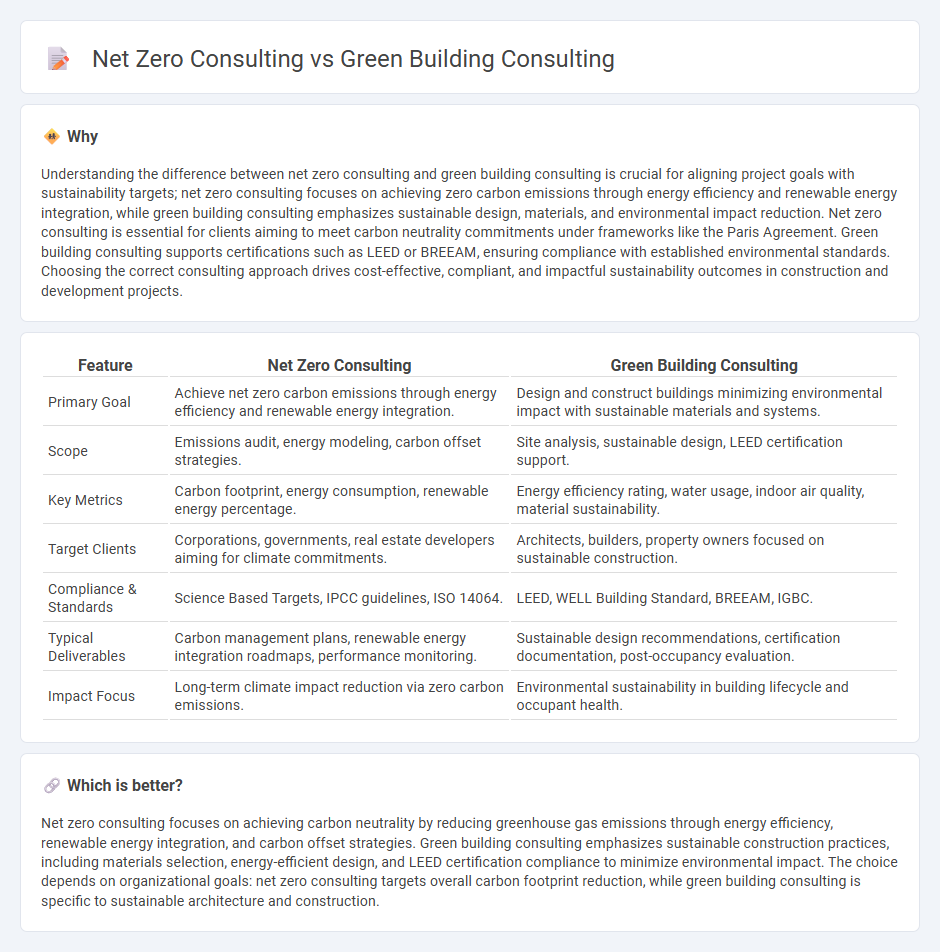
Net zero consulting focuses on strategies to achieve carbon neutrality by minimizing energy consumption and maximizing renewable energy use in buildings and operations. Green building consulting emphasizes sustainable design, material selection, and construction practices to reduce environmental impact throughout a building's lifecycle. Learn more about how each consulting approach drives sustainability and energy efficiency goals.
Why it is important
Understanding the difference between net zero consulting and green building consulting is crucial for aligning project goals with sustainability targets; net zero consulting focuses on achieving zero carbon emissions through energy efficiency and renewable energy integration, while green building consulting emphasizes sustainable design, materials, and environmental impact reduction. Net zero consulting is essential for clients aiming to meet carbon neutrality commitments under frameworks like the Paris Agreement. Green building consulting supports certifications such as LEED or BREEAM, ensuring compliance with established environmental standards. Choosing the correct consulting approach drives cost-effective, compliant, and impactful sustainability outcomes in construction and development projects.
Comparison Table
| Feature | Net Zero Consulting | Green Building Consulting |
|---|---|---|
| Primary Goal | Achieve net zero carbon emissions through energy efficiency and renewable energy integration. | Design and construct buildings minimizing environmental impact with sustainable materials and systems. |
| Scope | Emissions audit, energy modeling, carbon offset strategies. | Site analysis, sustainable design, LEED certification support. |
| Key Metrics | Carbon footprint, energy consumption, renewable energy percentage. | Energy efficiency rating, water usage, indoor air quality, material sustainability. |
| Target Clients | Corporations, governments, real estate developers aiming for climate commitments. | Architects, builders, property owners focused on sustainable construction. |
| Compliance & Standards | Science Based Targets, IPCC guidelines, ISO 14064. | LEED, WELL Building Standard, BREEAM, IGBC. |
| Typical Deliverables | Carbon management plans, renewable energy integration roadmaps, performance monitoring. | Sustainable design recommendations, certification documentation, post-occupancy evaluation. |
| Impact Focus | Long-term climate impact reduction via zero carbon emissions. | Environmental sustainability in building lifecycle and occupant health. |
Which is better?
Net zero consulting focuses on achieving carbon neutrality by reducing greenhouse gas emissions through energy efficiency, renewable energy integration, and carbon offset strategies. Green building consulting emphasizes sustainable construction practices, including materials selection, energy-efficient design, and LEED certification compliance to minimize environmental impact. The choice depends on organizational goals: net zero consulting targets overall carbon footprint reduction, while green building consulting is specific to sustainable architecture and construction.
Connection
Net zero consulting focuses on strategies to reduce carbon emissions to zero, aligning closely with green building consulting which emphasizes sustainable design and construction practices to minimize environmental impact. Both consulting services utilize energy efficiency measures, renewable energy integration, and advanced building technologies to achieve ecological goals. Combining these approaches enables clients to meet stringent environmental standards and promote long-term sustainability in the built environment.
Key Terms
Sustainable Materials
Green building consulting emphasizes the selection and integration of sustainable materials such as recycled steel, bamboo, and low-VOC paints to reduce environmental impact and enhance indoor air quality. Net zero consulting prioritizes materials with high energy efficiency and carbon sequestration properties, including advanced insulation, solar reflective roofing, and phase-change materials to achieve net zero energy consumption. Discover how sustainable material choices differ between these consulting approaches to maximize environmental benefits.
Carbon Neutrality
Green building consulting emphasizes sustainable design and construction practices to minimize environmental impact through energy-efficient materials and systems. Net zero consulting specifically targets achieving carbon neutrality by balancing emitted and offset greenhouse gases, often through renewable energy integration and advanced energy management. Explore how tailored consulting approaches can help your project achieve optimal carbon neutrality goals.
Energy Modeling
Green building consulting encompasses holistic strategies for sustainable design and construction, incorporating energy modeling to optimize building performance and reduce environmental impact. Net zero consulting specifically targets achieving a balance between energy consumption and production, using advanced energy modeling to guide renewable energy integration and maximize efficiency. Explore our detailed insights to understand how energy modeling drives both green building success and net zero goals.
Source and External Links
Why Green Building Consulting Is an Opportunity - Green building consulting promotes eco-friendly, sustainable construction for new and existing projects, helping businesses reduce carbon footprints, improve energy efficiency, and comply with environmental regulations through expertise combined with marketing and management skills.
Lorax Partnerships | Green Building Consulting Services - Lorax offers consulting on green building rating systems such as LEED, WELL, and Energy Star, providing services including energy modeling, commissioning, IAQ testing, and financial justification to achieve sustainability goals and optimize ROI.
Green Building Consulting - Cincinnati - Provides training, energy modeling, testing, certification support, and educational programs through Green Building University, focusing on environmentally sustainable building practices and building science for builders, architects, and contractors.
 dowidth.com
dowidth.com